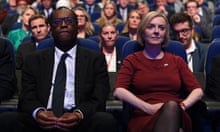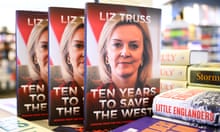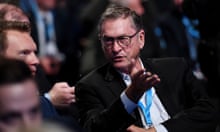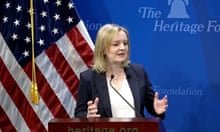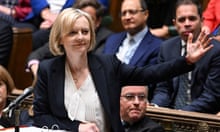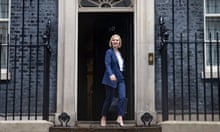Liz Truss, the former British prime minister, spoke at a far-right conference in America on Wednesday, styling herself as a populist who took on America’s equivalent of the “deep state” in her own country.
Truss was among the headline speakers at this week’s Conservative Political Action Conference at the National Harbor in Maryland. CPAC is billed as the biggest annual gathering of conservatives in the US but has in recent years embraced Donald Trump’s brand of nativist-populism.
In Wednesday’s opening session, an “international summit”, the ex-PM sat side by side with Nigel Farage, former leader of the Brexit party, both with small union flags on the table in front of them.
Other speakers included Steve Bannon, a former White House chief strategist associated with global far-right nationalist movements, and Richard Grenell, a former acting director of national intelligence under Trump. Officials from countries including Australia, Hungary and Japan also took part.
A moderator at the summit introduced Truss by saying after her election in Britain “there was a collective cheer in the conservative movement in the United States saying, wow, Margaret Thatcher is back!”
Not for the first time Truss, whose premiership lasted only 50 days, sought to portray herself as the victim of bureaucratic forces. “I ran for office in 2022 because Britain wasn’t growing, the state wasn’t delivering, [and] we needed to do more,” she said. “I wanted to cut taxes, reduce the administrative state, take back control as people talked about in the Brexit referendum. What I did face was a huge establishment backlash and a lot of it actually came from the state itself.”
She continued: “What has happened in Britain over the past 30 years is power that used to be in the hands of politicians has been moved to quangos and bureaucrats and lawyers so what you find is a democratically elected government actually unable to enact policies.”
Truss was interrupted and asked to explain the meaning of “quango”. She replied: “A quango is a quasi non-governmental organisation. In America you call it the administrative state or the deep state. But we have more than 500 of these quangos in Britain and they run everything.”
She went on to list the Environment Agency, Office for Budget Responsibility, Bank of England and Judicial Appointments Commission. “There’s a whole bunch of people – and I describe them as the economic establishment – who fundamentally don’t want the status quo to change because they’re doing quite fine out of it. They don’t really care about the prospects of the average person in Britain and they didn’t want things to change and they didn’t want that power taken away.”
Truss added: “So I think that’s the issue we now face as conservatives. It’s not enough just to will conservative policies and say we want to control our borders or we want to cut taxes or we want to reform our welfare system because we have a whole group of people now in Britain with a vested interest in the status quo who actually have a lot of power.”
“Now people are joining the civil service who are essentially activists,” Truss said. “They might be trans activists, they might be environmental extremists but they are now having a voice within the civil service in a way I don’t think was true 30 or 40 years ago. So we just have a wholly new problem and, frankly, a hundred political appointees doesn’t even touch the sides in terms of dealing with them.”
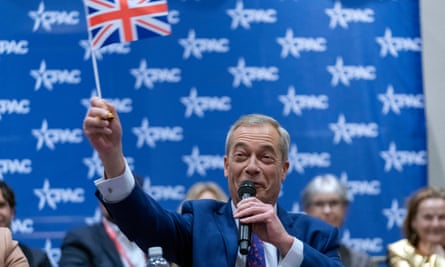
In an opinion piece published on the Fox News website, the former prime minister said agents of “the left” are active in the administrative state and “the deep state”.
“I saw this for myself first hand as they sabotaged my efforts in Britain to cut taxes, reduce the size of government and restore democratic accountability,” she wrote.
Truss took office after winning a Conservative party leadership contest to replace Boris Johnson. Her plan to spur economic growth with a mini-budget containing £45bn ($54bn) in unfunded tax cuts – including an income tax reduction for the highest earners – shook the financial markets and led to her swift demise.
Her remarks at CPAC were followed by Bannon, who at the same conference in 2017 vowed that then President Trump would wage an unending battle for “deconstruction of the administrative state”. On Wednesday Bannon said: “The administrative and deep state after President Trump wins, starting on the afternoon of the 20th of January, every day will be like Stalingrad. It will be a war to the knife.”
Bannon, a former executive chairman of Breitbart News, which he once described as “the platform of the ‘alt-right’”, a movement that has embraced racism and antisemitism, added: “If we want to save our country, we have to take down the administrative state. The prime minister has seen this up close and personal. You have to take down the administrative state.
“It’s an out of control fourth branch of government that our founders not only never envisioned, but would warn against. If they came back, they’d be furious. That internal fight is going to be absolutely vicious and we have to win it.”
Trump’s allies have been drawing up plans to “drain the swamp” in his second term by curtailing the independence of some federal agencies and ending government protections for tens of thousands of federal employees.
The Heritage Foundation is leading Project 2025, a coalition preparing for the next conservative presidential administration, and last year hosted speeches by leading Truss and fellow British Conservative Iain Duncan Smith.
The inaugural international summit was billed by CPAC as a chance to “bring together people from several continents around the world to share best practices and concrete solutions on how to fight the globalist takeover of sovereign nations”.
This year’s lineup of speakers on the main CPAC stage include Trump, Truss, Farage and Argentinian president Javier Milei, a libertarian known to fans as “the madman” and “the wig”. In past years the conference has heard from Hungarian prime minister Viktor Orbán and former Brazilian president Jair Bolsonaro.
An advert for Truss’s book, Ten Years to Save the West, was prominently displayed at the CPAC venue, the Gaylord National Resort & Convention Center, along with a volume by Tucker Carlson, a former Fox News host who recently conducted a fawning interview with Russia autocrat Vladimir Putin.

